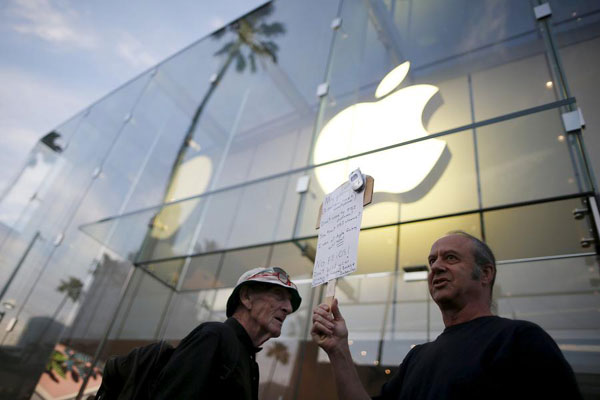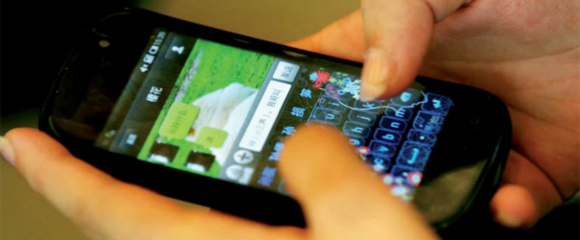US succeeds in cracking Apple's iPhone, drops legal action
Updated: 2016-03-29 09:32
(Agencies)
|
|||||||||
 |
|
People gather at a small rally in support of Apple's refusal to help the FBI access the cell phone of a gunman involved in the killings of 14 people in San Bernardino, in Santa Monica, California, United States, Feb 23, 2016. [Photo/Agencies] |
THORNY ISSUES
The Justice Department's apparent discovery of an iPhone hacking technique presents thorny questions about how that knowledge will be shared.
If the government tells Apple about the details, the company would presumably fix whatever vulnerability was used and thus render the method ineffective. If the government withholds the information, Apple could face a public perception problem about the security of its phones.
There are also a number of pending cases across the country where law enforcement officials are asking for access to iPhones. It is not clear if they will have access to the break-in technique.
In one New York case, Justice Department officials have to respond by Tuesday to an Apple request to delay the proceedings. That could provide clues as to how the government intends to deal with other iPhone cases.
On a conference call for reporters on Monday, a senior US law enforcement official said it was too soon to say whether the government's technique would work on other iPhones, or if it would share information with Apple or other law enforcement agencies.
The official also declined to elaborate on what party provided the solution, except to say it did not come from within the US government. He also declined to comment on what had been found on the San Bernardino phone.
'ALL AVAILABLE OPTIONS'
The Justice Department suggested on Monday it would keep seeking unorthodox means of getting information, including through the courts when needed.
"It remains a priority for the government to ensure that law enforcement can obtain crucial digital information to protect national security and public safety, either with cooperation from relevant parties, or through the court system when cooperation fails," Justice Department spokeswoman Melanie Newman said.
"We will continue to pursue all available options for this mission, including seeking the cooperation of manufacturers and relying upon the creativity of both the public and private sectors."
On Capitol Hill, critics of the Justice Department's efforts called for further vigilance.
"Those worried about our privacy should stay wary - just because the government was able to get into this one phone does not mean that their quest for a secret key into our devices is over," said Representative Darrell Issa, a California Republican who sits on the House Judiciary Committee.
Related Stories
FBI: Attacker's phone possibly accessible without Apple help 2016-03-23 08:28
Apple lawyer, FBI director face off in Congress on iPhone encryption 2016-03-02 09:51
Apple fights back in court, refusing to hack into iPhone for FBI 2016-02-26 09:21
Apple, FBI battle over privacy rules 2016-02-24 08:36
Apple ordered to help FBI access terror killer's phone 2016-02-17 14:14
Today's Top News
Xi arrives in Czech Republic for state visit
Panda to join Little Mole in new cartoon series
President optimistic for Sino-German cooperation
Info sharing 'is key' as Europe faces terror threat
Uneasy times as Belgium mourns the dead
Belgian bombing suspect still at large: Prosecutor
Belgian media withdraws reports of suspect's arrest
Brussels bombers were brothers El Bakraoui
Hot Topics
Lunar probe , China growth forecasts, Emission rules get tougher, China seen through 'colored lens', International board,
Editor's Picks

|

|

|

|

|

|






